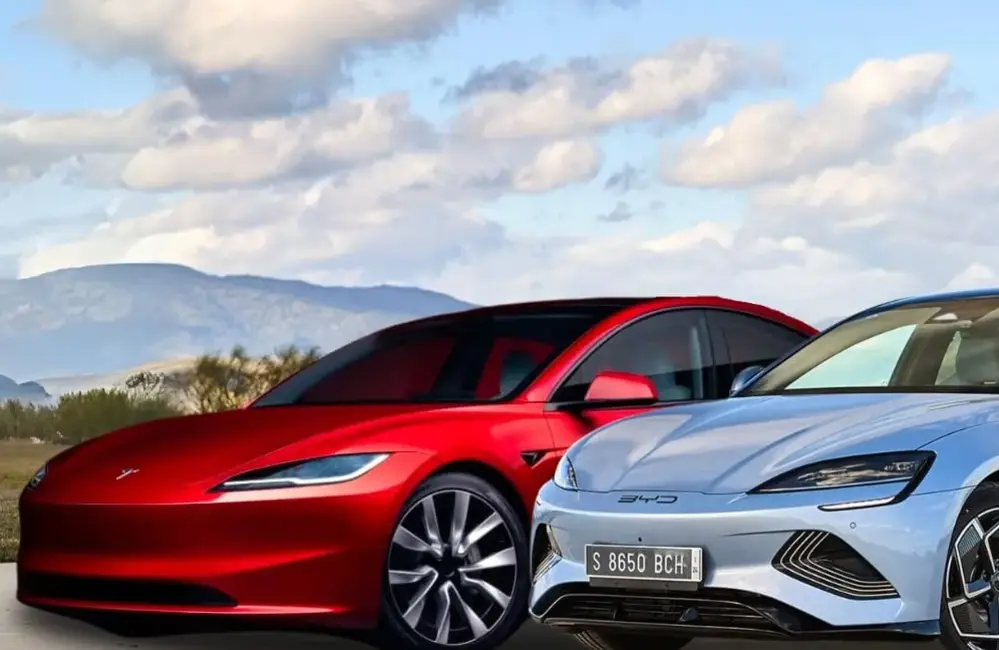The electric vehicle industry worldwide is experiencing a dramatic overhaul, and Tesla and BYD stand out as its primary leaders.
Tesla has maintained its position as the leading symbol of electric vehicle advancement for years, but BYD's rapid ascension is transforming industry competition dynamics. UK investors seeking growth in the EV market need to understand the relationship between Tesla and BYD.
This evaluation examines how these two companies perform in the market and the different approaches each employs while considering what these differences mean for investors.
Market Performance and Sales
The EV market experienced a major transformation throughout the first quarter of 2025. BYD delivered nearly 1 million vehicles worldwide, including 416,000 all-electric cars, achieving a 58% increase in sales from the previous year and surpassing Tesla in delivery numbers. BYD forecasts Q1 net earnings between $1.2 billion and $1.4 billion, which surpasses Wall Street projections.
The same period showed Tesla's vehicle delivery count at 337,000, which indicated a 13% year-over-year drop. Despite staying profitable, the company generates lower earnings than BYD's explosive growth, prompting stakeholders to question its future in a developed market.
Due to impressive performance results and innovative advancements, investors have seen BYD's stock climb by 24% in 2025. Tesla's stock value dropped by 45% throughout the current year because investors worry about its reduced growth speed and increasing market competition.
Strategic Approaches
BYD’s Vertically Integrated Model
The main advantage of BYD's production system stems from its vertically integrated manufacturing approach. BYD achieves substantial cost savings through its in-house production of 80% of vehicle components, which enables it to maintain competitive pricing. BYD's innovation portfolio features five-minute charging technology and the "God’s Eye" assisted driving system, demonstrating its commitment to providing affordable, cutting-edge solutions.
BYD aims to grow its global presence by focusing on markets like Europe, South America, and Southeast Asia while steering clear of the US due to a complete tariff on Chinese-made electric vehicles. The strategy is designed to match its goal of ranking among the top three global EV brands by 2030, with plans to secure a substantial market presence in critical regions such as the UK.
Tesla’s Software Innovation Leadership
Tesla stands out because of its strong emphasis on software innovation and its aspirational brand image. Tesla relies heavily on its wide Supercharger network and autonomous technology advancements to offer the promise of fully self-driving vehicles as core elements of its value proposition.
Tesla struggles against challenges due to an outdated vehicle range, while Elon Musk's controversies attract increased attention. Tesla's high prices expose it to risks in markets where consumers increasingly search for value, as competitors like BYD offer affordable but powerful vehicle options.
Geopolitical and Trade Considerations
The EV market landscape is heavily influenced by geopolitical dynamics. American tariffs on Chinese products have blocked BYD's vehicles' access to the US market. These policies unintentionally make BYD more competitive in Latin America and Europe, allowing it to concentrate on regions that present fewer market entry challenges.
Tesla enjoys US tax credits while facing competitive difficulties in China because local companies like BYD control the market. The escalating conflict between China and Western nations threatens to disrupt Tesla’s supply chain operations and market reach while generating potential risks for investment portfolios.
UK investors need to pay attention to localisation strategies. BYD might lessen trade risks and accelerate its global market growth by setting up manufacturing operations outside of China.
Brand Perception and Market Positioning
BYD’s Appeal to Value-Conscious Consumers
BYD has established itself as an affordable automotive leader with vehicle models priced below $10,000. BYD captures middle-income consumers while quickly expanding their market share in regions sensitive to pricing.
BYD faces difficulties in Western markets like the UK because its brand recognition remains limited. Data shows that 21.2% of UK consumers recognise BYD, while 93.5% know about Tesla. Even though limited brand recognition exists, BYD enjoys positive valuation from those who know about it, which creates growth opportunities as awareness rises.
Tesla’s Aspirational Branding
The premium electric vehicle market remains under Tesla's control as it targets wealthy customers and the younger population. The Tesla brand represents advanced technology and innovation, transforming it into a prestige symbol in wealthy markets.
Tesla's dependence on Elon Musk’s divisive persona presents both advantages and risks. Musk's innovative vision draws dedicated supporters yet drives away parts of Tesla's broader audience through recurring controversies. UK investors should maintain vigilance over brand perception and leadership dynamics.
Investment Implications for UK Investors
Stock Performance and Valuation
Tesla's price-to-earnings ratio is 138, which shows strong anticipated growth but also creates valuation risk for investors. BYD's balanced growth profile is evident through its moderate P/E ratio of 26, which makes it a less risky investment for those looking for stable returns.
BYD demonstrates excellent long-term investment potential due to its commitment to diverse markets and cost-effective operations, which makes it appealing for emerging and price-sensitive markets. Tesla represents a riskier investment opportunity that provides access to cutting-edge technologies such as autonomous driving, which has the potential to increase its value if these technologies come to fruition greatly.
Risks and Opportunities
UK investors need to evaluate the individual risks linked to each company before making an investment decision.
BYD:
BYD faces risks from geopolitical tensions and regulatory scrutiny while struggling to establish brand equity in Western markets.
The company's strong cost structure, fast revenue growth, and growing global presence create valuable opportunities.
Tesla:
Tesla faces market risks, such as stock market fluctuations, competitive pressures, and heavy dependence on Elon Musk's leadership.
The company capitalises on its software innovation leadership and strong brand equity and global market presence.
Investment decisions in Chinese corporations like BYD require thorough risk assessment due to regulatory and transparency challenges.
Key Takeaways for UK Investors
Diversify Your Portfolio
Investment portfolios can benefit from the unique strengths of both Tesla and BYD, which complement each other well. BYD delivers market stability and leadership in cost management, while Tesla offers investment exposure to fast-growing yet risky innovative developments.
Monitor Geopolitical Developments
Ongoing trade disputes and import tariffs will keep impacting each of these companies' operations. Evaluate the potential impacts of these variables on both expansion strategies and production costs.
Focus on the Long Term
The EV market continues to expand, and investors will likely experience short-term market fluctuations. Evaluate how these companies can achieve continual growth while adjusting to changing market environments.
The Future of the EV Market
The competition between BYD and Tesla demonstrates how power dynamics are changing in the electric vehicle sector. UK investors now have a chance to profit from increasing electric vehicle use but must balance potential risks.
BYD gains a market advantage in emerging regions because of its affordable prices and vertical business structure while Tesla stands out with its technological advancements and strong brand reputation as a driver of long-term success. The choice of whether to invest relies on each person’s level of risk acceptance, coupled with their specific investment targets.

















